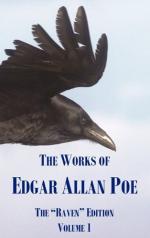|
This section contains 6,629 words (approx. 23 pages at 300 words per page) |

|
SOURCE: St. Armand, Barton Levi. “Poe's Unnecessary Angel: ‘Israfel’ Reconsidered.” In Ruined Eden of the Present: Hawthorne, Melville, and Poe, pp. 283-302. West Lafayette, Ind.: Purdue University Press, 1981.
In the following essay, St. Armand compares Poe's “Israfel” with Ralph Waldo Emerson's “Uriel.”
Poe's poem “Israfel” has traditionally been seen as an idealized portrait of the artist, as a bold aesthetic manifesto, or as a failed exercise in romantic agony. T. O. Mabbott states that “It has been customary to identify Poe with his angel,”1 Edward Davidson calls “Israfel” “a poem on the theory and practice of poetry,”2 and Hyatt Waggoner, contrasting it with Emerson's vigorous “Merlin,” writes that although both poems point toward the Platonic, “Poe's figure implies self-pity, while Emerson's figure implies only the poet's transcendence of ordinary logic and mundane rationality.”3 “The final effect of ‘Israfel’ is that of pathos,” Waggoner concludes, and he adds insult...
|
This section contains 6,629 words (approx. 23 pages at 300 words per page) |

|


